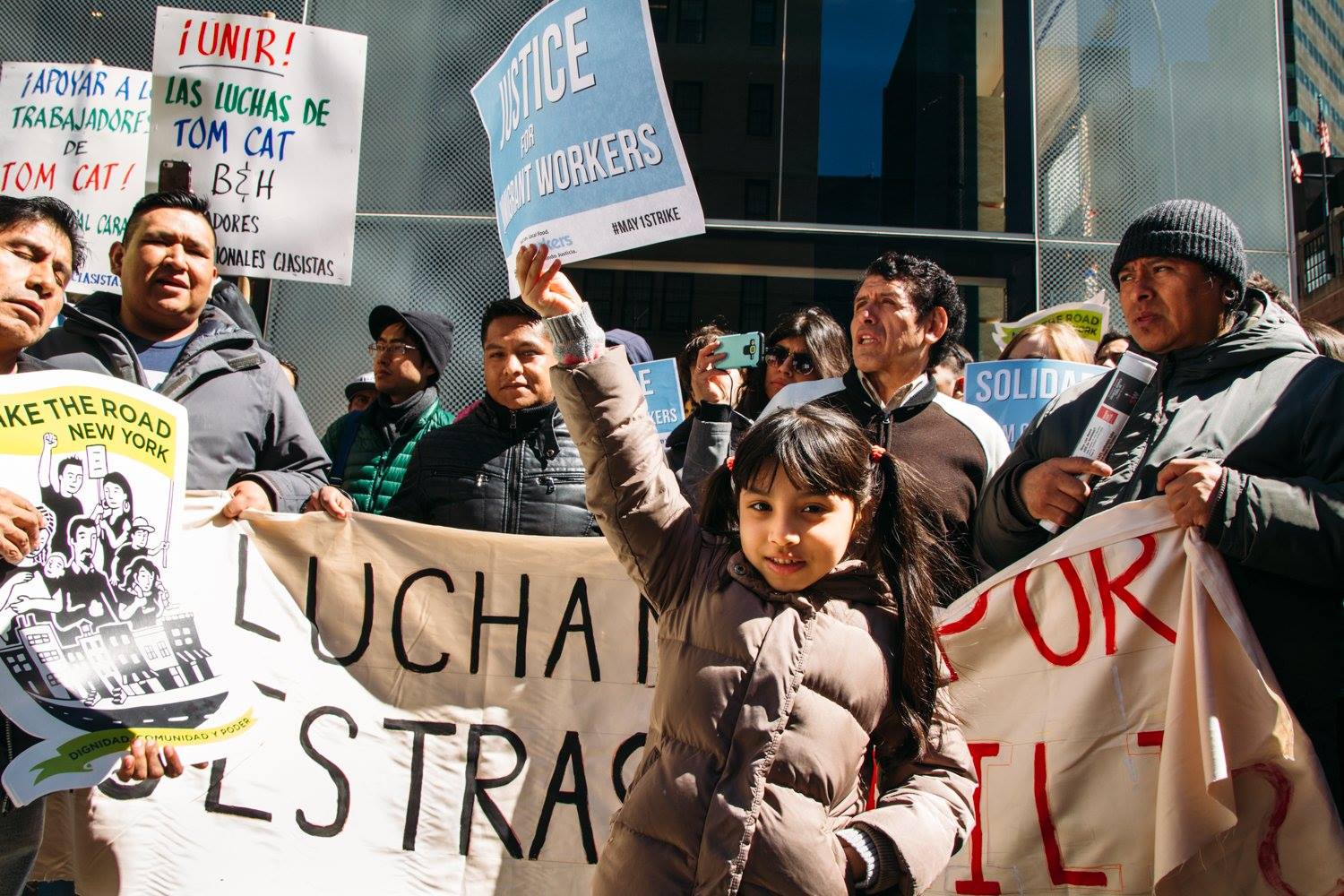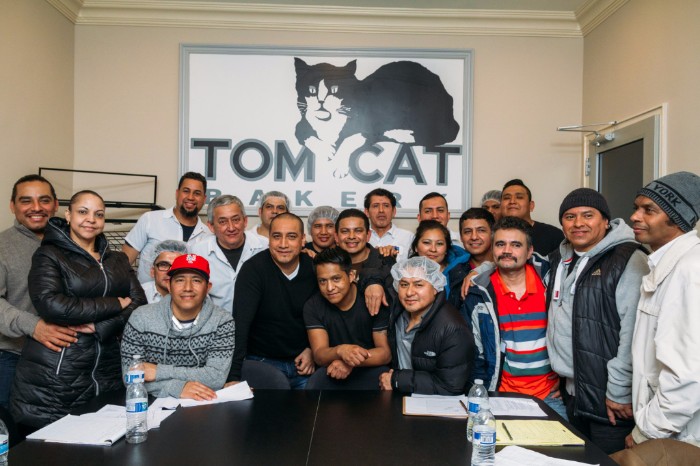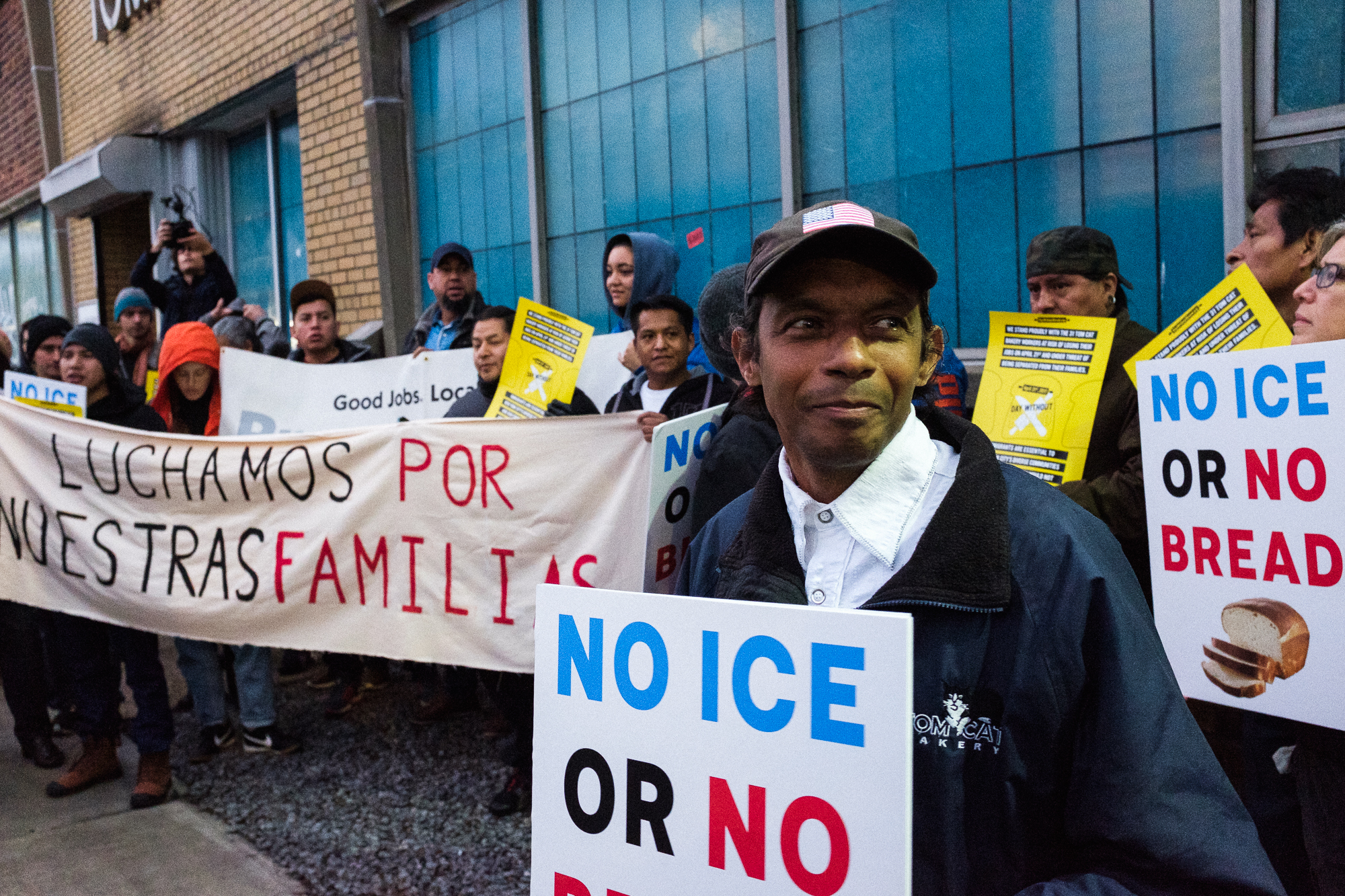Brandworkers is a regular client of ours, and it has been amazing to see them grow over the years. They’re doing some of the most important labor organizing there is, with no end in sight! We caught up with Development Coordinator, Winnie Zwick, to talk about the organization.
Who is Brandworkers as an organization and how did you begin organizing food production workers?
Since 2007, local food industry workers across the New York area have been organizing through non-profit organization Brandworkers to win a better life for themselves, hold employers accountable, and make sure local food jobs are good jobs. Using organizing and direct action to negotiate with employers for job quality gains, Brandworkers members have found a durable, flexible model to win major victories throughout the New York area.
Starting in New York City, Brandworkers members are joining together to:
- Set new standards on pay, benefits and working conditions in the local food industry;
- Give workers in this thriving sector a voice on the job;
- Resist the politics of hate and divisiveness emanating from Washington and directed at immigrants and people of color; and
- Forge a new model of organizing that could transform the food manufacturing industry and other workplaces in New York and beyond.

Brandworkers launched its Focus on the Food Chain campaign in 2007 and then, a year later, started its first organizing drive, when workers at seafood distributor Wild Edibles joined together to fight years of wage theft and exploitation. Through direct action, community organizing and media advocacy, more than 75 high profile New York City restaurants, including Union Square Café, Pastis, and Mermaid Inn, stopped serving seafood from Wild Edibles.
The workers’ campaign created a powerful economic incentive for the company to end its sweatshop practices and follow the law. Brandworkers members recovered more than $340,000 in illegally withheld wages and compensation for retaliation and won a binding agreement protecting all workplace rights, including the right to address grievances collectively. More importantly, it marked the birth of a direct-action model for Brandworkers members that continues to help workers across the city’s food manufacturing sector win big gains.
What are some things you’ve achieved since you’ve been around?
Factory by factory and store by store, Brandworkers members are transforming the local food industry. Here are a few of Brandworkers’ member victories:
Tom Cat Bakery Workers Choose Resistance
Workers at Tom Cat Bakery in Queens have been organizing with Brandworkers since 2011. Together, the workers ousted an abusive executive, ended a system where they were paid less through a sham company, fought off cuts to their benefits and won a settlement against retaliation. But in March 2017, the company threatened to fire dozens of immigrant workers following a Department of Homeland Security investigation. Instead of giving up and walking away from their jobs, Tom Cat workers chose resistance and took to the streets. Hundreds marched on Trump Tower to signal their defiance against the Trump Administration’s draconian immigration policies, a move which galvanized community and political support and rallied the city around the workers and rallied the city around the workers in a “Day Without Bread” that reached from Yemeni bodegas to catering companies to restaurants.
Justice for Juan Baten
On January 24, 2011, food worker Juan Baten died at Tortilleria Chinantla in Bushwick, Brooklyn, because the owner refused to install a simple and legally required machine guard. Workers rallied around Rosario Ramirez, Juan’s widow, and refused to let company-owner Erasmo Ponce pass the buck and continue to exploit and endanger his workforce. After more than a year of worker organizing and activism, workers won back $450,000 of stolen pay and Ponce served jail time for charges stemming from the case.
Fairness at Flaum Appetizing
For years, workers at Kosher food company Flaum Appetizing struggled under intolerable conditions. Food workers often ran 80-hour work weeks but were routinely denied overtime and sometimes were paid below the minimum wage. When the company fired seventeen workers in retaliation for coming together and demanding their back pay, the workers quickly launched a workplace justice campaign with Brandworkers, educating Flaum’s consumers and business partners about how it mistreats its workforce. By the end of the campaign, 120 grocery store locations stopped selling Flaum products and the world’s largest kosher cheese company, Tnuva, had discontinued its relationship. In May 2012, Flaum returned $577,000 in unpaid wages and compensation to workers.
A Big Win for Workers at Wild Edibles
In 2008, dozens of workers launched a two-year boycott campaign at seafood purveyor Wild Edibles over rampant wage theft. As reported in the New York Times, workers employed “picketing and a campaign in the news media” to convince 70 restaurants to boycott the company, including high-profile restaurants like Union Square Café, Mermaid Inn, Pastis, and One if by Land, Two if By Sea. The boycott drove the company into bankruptcy, and finally forced it to pay back $340,000 in back pay and damages to the stiffed workers.
Shedding a Light on Local Food
Brandworkers has helped shed a light on the conditions in New York’s local food industry by partnering with the Community Development Project of the Urban Justice Center to publish Feeding New York, the first report on conditions in NYC food manufacturing from the perspective of workers. The report found that local food companies deny workers health care and paid sick days; systematically ignore health, safety, and wage laws; and often discriminate on the basis of gender, race, and immigration status.
Raising the Bar for Local Food Subsidies
Brandworkers built a coalition including ALIGN, Good Jobs NY, RWDSU, NELP, and many others to successfully incorporate a mandatory code of conduct and increase transparency in a city financing program, the NYC Food Manufacturers Growth Fund, to prevent public dollars from benefitting the local food employers that exploit or mistreat their workers.

What is the biggest issue for food production workers right now?
New Yorkers are hungry for locally-sourced food because they believe it’s healthy and socially responsible, but most don’t know what they eat is manufactured by working men and women who can barely afford to feed their own families.
Local food corporations are expanding and raking in profits while skimping on basic safety precautions, stealing workers’ wages, and paying them so little—without any benefits—that many rely on public assistance to get by. New York City’s local food industry could provide good jobs for our communities; instead, food manufacturers are exploiting a workforce made up predominantly of immigrants of color, African-Americans, and women and exacerbating inequality.
Traditionally, workers have joined together in unions to fight for higher pay and better working conditions, but the current system governing workers’ ability to form their own organizations is outmoded and broken. Corporations and politicians have rigged our economy and politics—stripping workers’ bargaining power, squeezing pay and making it harder for people to get ahead—so the powerful win at the expense of the rest of us.
Laws that once helped workers form unions and build the middle class have not kept up with corporations’ efforts to suppress the power of organized labor. As a result, local food workers in New York City—and workers across the country—are falling behind. In addition, the Trump Administration has launched a massive crackdown against immigrant workers, who form the core of the local food industry in New York.
How does the current political climate in the United States—especially regarding job creation, healthcare, and other hot topic issues—affect your organizing?
The “Day Without Bread” campaign was just the start of Brandworkers’ emerging role as a leader in the anti-Trump resistance. Brandworkers members are now deeply engaged with community and labor partners in a sustained fight against the Trump Administration’s crackdown on immigrant workers and other communities under attack, including playing a key role in the massive 2017 May Day strike that included participation by hundreds of thousands of immigrants, indigenous peoples, African Americans and other marginalized groups.

How do you use print in your campaigns to help workers build power?
We use print to reach workers at their workplaces and homes, communicate with and put pressure on food manufacturers and customers to improve their labor practices and stand with workers, and allies of all types to provide opportunities to work in solidarity with local food workers.
How can people get involved with Brandworkers?
Responsible restaurants and supermarkets can use their purchasing power to get companies that exploit employees to treat workers fairly. By refusing to source products from companies that steal workers’ pay and don’t respect their right to a voice on the job, these responsible restaurants and supermarkets can play a role in making the food production industry sustainable for workers.
And by speaking out about how truly sustainable food must be produced by workers who can support their families and who have a voice on the job, consumers can use their voice to get companies to treat workers fairly. With the power of their purse, consumers can play a big part in making local food work for everyone.
Get involved by signing up for email updates about upcoming events and campaign actions at brandworkers.org. Follow us on Facebook, Twitter and Instagram! Send us an email letting us know that you’d like to volunteer to support our campaigns or ally organizing! And become a donor to directly enable Brandworkers’ fighting spirit through sustainable independent funding free from corporate or government influence!
Community Spotlight is a blog series that seeks to connect people power with print power. Each month, we feature an organization using print to do great work in their community and fight for a more just world. Subscribe today and let’s start building together.




